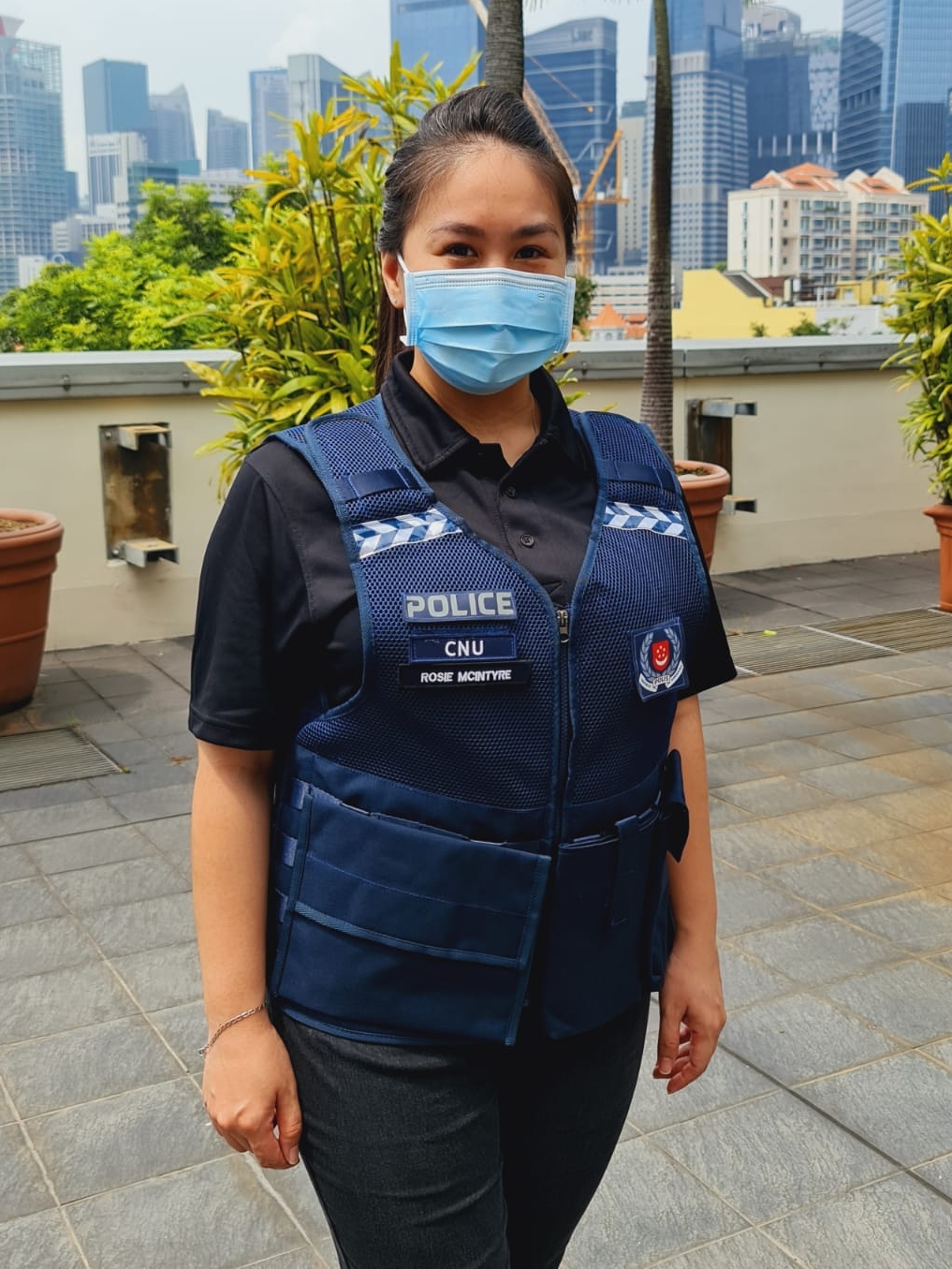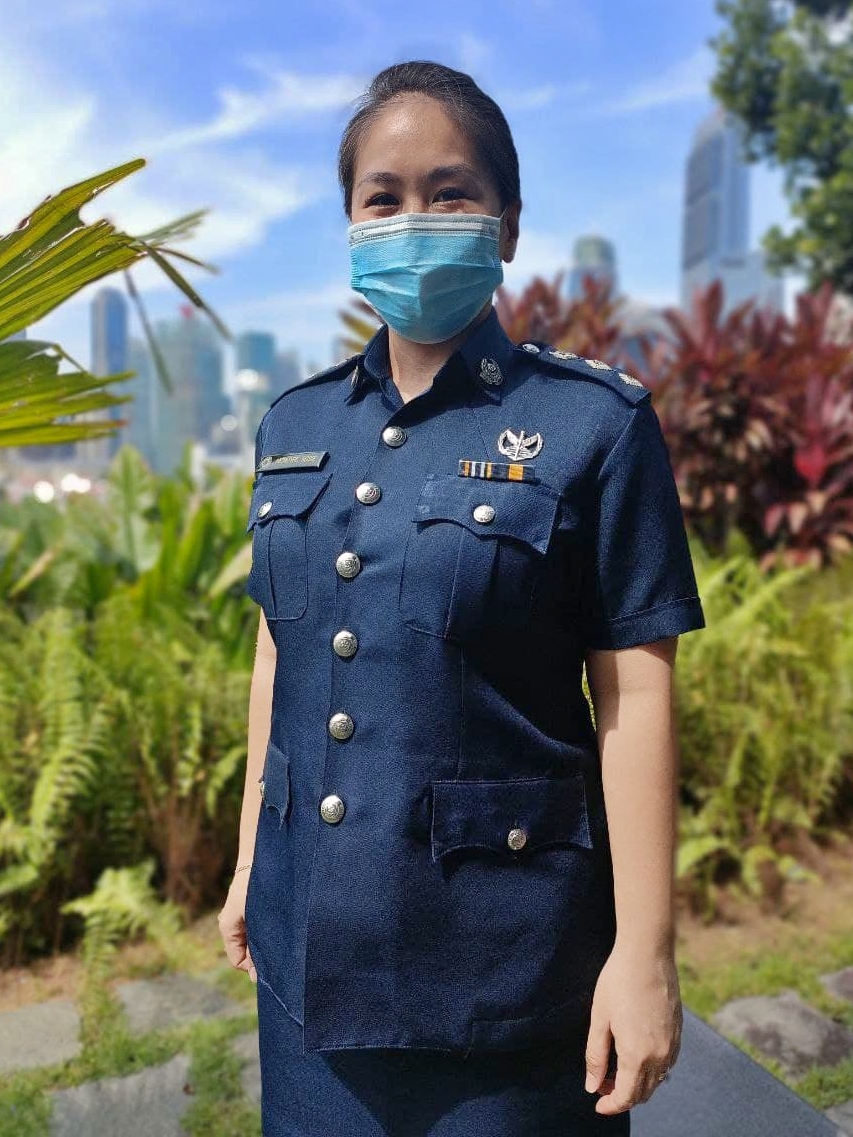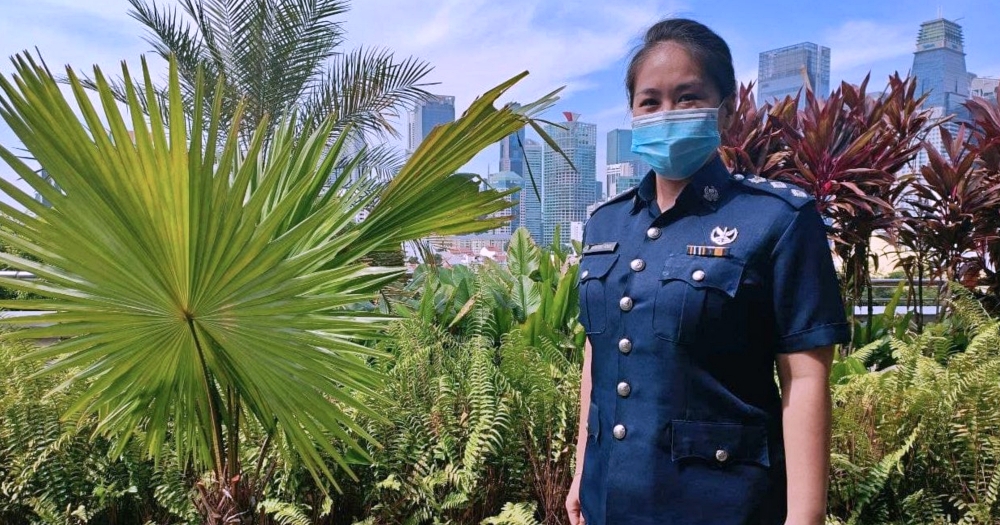PERSPECTIVE: Superintendent McIntyre Rosie Ann, 36, is part of the Crisis Negotiation Unit (CNU), a specialist unit of the Singapore Police Force (SPF). She has been in CNU since 2012.
CNU comprises psychologists and negotiators. The negotiators are police officers from various police units holding secondary appointments.
CNU's mission is to save lives by defusing potentially life-threatening situations through negotiation. This includes dealing with cases involving barricaded subjects or those who attempt to commit suicide.
Speaking to Mothership, Rosie shares her experience as a negotiator for nearly 10 years and the different high-stakes cases she has had to handle.
As told to Syahindah Ishak
There was a woman seated on a railing at one of the top floors of a HDB block. A police officer had already tried to engage her but she remained quiet.
My team assessed that a female officer should speak with her to build that rapport.
I happened to be the first female CNU officer to arrive at the scene. I was very, very nervous and really concerned for her safety.
When I saw the woman seated at the narrow railing, which had a width of no more than five centimetres, it made me very concerned that she might slip and fall.
She had been there for about an hour, so it was visible that she was tired after sitting on the railing for that long. Her hands were trembling.
I spoke to her, expressing my concern for her safety, and asked her to come down: “You look very tired. Why don’t you come down?”
She admitted that her leg felt numb. Then she kept quiet again.
In that moment, I took the opportunity to get another female officer and myself to assist her to climb down, and to make her as comfortable as possible.
She used one of her hands to reach out to us, while the other was still on the railing. My other colleagues leaned in to get her away from the railing.
We gently helped her in. Thankfully, this was a successful intervention.
Could you elaborate more on the type of cases that CNU deals with?
We deal with a number of cases, including suicide interventions, such as the one that I’ve experienced, as well as barricaded incidents.
We are called in for these type of cases where negotiation is required to try and resolve the situation peacefully. But more often than not, a lot of the cases we get are suicide-related.
Have you experienced a barricade incident before?
Yes, I’ve experienced several barricaded incidents since I joined CNU.
One example of CNU being involved in a prolonged barricaded situation would be the Sembawang case several years ago, which many may recall.
The subject was in the unit with a child and we were concerned for the child's safety.
The case involved a very prolonged negotiation because it was 17 hours long.
Do the negotiations usually last this long?
It really depends, it could sometimes be very long, but there have been cases where we only talked to the subject for about five to 10 minutes before the situation is resolved.
How do you deal with cases that are very prolonged?
Of course, these cases take up the officers' energy. The officers are also human. Fatigue will set in.
So for prolonged cases, there are replacement plans within our units to have a change of teams. This will allow us to maintain the level of stamina needed to deal with the case.
The team taking over will be briefed on the latest status of the case and the background. They will come in prepared.
How long have you been in CNU?
I’ve been in CNU since 2012.
 Photo by Mothership.
Photo by Mothership.
Before that, were you already in the police force?
I was a police officer at the start. I joined the police force in 2007 and did the foundation posting that police officers go through.
After that, I did staff posting at operations department. That’s when I joined CNU.
Why did you decide to join CNU?
As a staff officer, you don't get as much ground exposure. When you’re doing staff work, you tend to miss the ground.
CNU gave me that opportunity, allowing me to stay in touch with the ground. It gave me a very interesting set of skills.
What are some of these "interesting" skillsets?
Empathy, observing and active listening are important. They are the fundamentals of negotiations, particularly active listening.
We pay attention to the smallest details that the subject is saying because that affects his/her emotions.
Sometimes, they may say things in a certain manner but they mean something else. There’s an underlying meaning. So we have to pay attention to all the small details to really understand what’s the underlying problem they are facing.
As a CNU officer, we also need to build rapport with the subject we’re speaking to. The skill set would require us to make sure we’re in the right frame of mind.
We are there to try to talk to the subject, and find a solution that is peaceful and safe for everyone involved.
That’s what we need to do: We have to have our heart in the right place.
Do you need to have a background in psychology?
Police officers don’t need to have a background in psychology to become a negotiator.
When I first joined CNU, I went through a one-week course in order to be trained in crisis negotiation. After that, we had to go through a lot of psychology assessment, scenario-based tests, exercises, and interviews before we are ready.
The negotiators are primarily police officers. However, we are supported by a team of psychologists who give us insights on how to engage with different subjects and states of mind.
They also explain to us more about mental health, because it may sometimes have implications on certain situations.
How many cases have you had to deal with as a CNU officer throughout your career?
To be honest, I don't keep track. But it really depends, there's no specific number per month or per week.
What do you do on a day-to-day basis when you're not dealing with these types of cases?
CNU is a secondary role. On a normal day, we still do our core functions and core duties.
For me, I will continue my role as the commanding officer of Bukit Merah East Neighbourhood Police Centre (NPC). I manage the operations and the manpower issues of the NPC.
We have very supportive supervisors who are aware of our involvement in CNU and they know that when a call comes in, we would have to leave and deal with the case.
 Photo by Syahindah Ishak.
Photo by Syahindah Ishak.
Is it difficult to balance and differentiate those two roles?
As a commanding officer, I deal with my officers very often. In fact, I deal with my officers more than the general public.
But as a CNU officer, that's where I maintain my ground experience by responding as an officer on the ground.
So it's quite different, which is why I like being part of CNU. It keeps me grounded and on my toes.
What are some of the challenges that you face as a CNU officer?
One of the main challenges that negotiators tend to face is establishing the initial engagement with the subject.
Most of the time, the subject doesn't want to talk, or they could be intoxicated, high or having mental health issues.
To overcome this, we will make ground enquiries.
We will establish who the subject is and we will do some research to find out if there was anything else that led to the current case.
We will check with the subject's family members and talk to the member of the public who had called the police to get more information. We will also try to see if there were previous cases involving the subject.
From there, after doing research and getting information, we will then talk to the subject and start our negotiation tactics.
What are some misconceptions about your role in CNU?
Some of the misconceptions people have is that 1) negotiators are very good at talking, and 2) we work alone.
This probably stems from how negotiators are portrayed in movies, where they usually have one powerhouse negotiator dealing with the entire case.
But that's not true in real life.
We don't work alone. We always work as a team, which includes both negotiators and our psychologists from the police psychological services department.
Another misconception that people have is that we can resolve everything, which is not always the case.
Have you experienced a failed intervention/negotiation?
There have been cases where the negotiation wasn't working, or we weren't able to build a rapport with the subject to get him/her out.
That is when we have the support of our special operations command. They are the ones who will then make the entry and access the unit to ensure the safety of the subject.
In some cases, the subject could be harming himself or herself and might even do so when we are talking to them. That is when we have to step back, and let the tactical forces take over.
Of course, forced entry is the last resort and we try to solve these cases as peacefully as possible.
But sometimes, these are the tough decisions that the ground commander has to make.
Have you ever been emotionally or mentally affected by a case?
To be honest, I've been quite fortunate.
For the case I mentioned earlier regarding the woman sitting on the railing... I was very very concerned for her safety, and if she were to fall off the railing... I was concerned that it would have an impact on me.
Thankfully, that wasn't the case. I knew I had the support of my teammates to deal with the incident.
But yes, at that point, I was very nervous and stressed. I mean, such situations would put you in the hot seat. To be honest, my hands were clammy and I was perspiring but I just took a deep breath and told myself to focus.
To manage that stress, I focused all my energy on observing her and making sure that I chose the right words when talking to her.
I also focused my attention on all of her movements, so that I could connect with her, build that rapport with her, and make her trust me.
If I let myself get overwhelmed, it isn't going to help anybody, so I had to channel that energy in the right areas to help the situation.
For officers who are affected, what kind of help can they receive?
Typically we have an after action review after the case where we would discuss the areas where we can learn from and improve on.
For officers who are deeply affected by certain cases, we have the support of the psychologists to help them manage their emotions.
The team also plays an important part. Some officers do question if they are to be blamed for certain mistakes, but the team will come in and play a supportive role.
We will assure one another that we have done what we could in that situation and no one is at fault.
It's easier said than done, but we will always have the support of others in the team.
After being in CNU for nearly 10 years, what are some learning points for you?
I would say that CNU is a secondary appointment which I hold close to my heart. Being in CNU reminds me why I joined the police force, which is to help people and do the right thing.
In managing the different cases as a CNU officer, it gives me the opportunity to be more empathetic and understanding towards others.
It's beyond just the skill sets that I learnt in CNU. Through the cases, I grow both as an officer and as a human being.
This is why being on the ground is important to me, it's shows the realities of police work and life in general.
Top image by Syahindah Ishak.
If you like what you read, follow us on Facebook, Instagram, Twitter and Telegram to get the latest updates.
